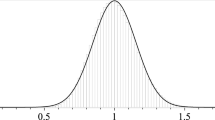Abstract
A cross-product free (CPF) Jacobi–Davidson type method is proposed to compute a partial generalized singular value decomposition (GSVD) of a large regular matrix pair \(\{A,B\}\), called CPF-JDGSVD. It implicitly solves the mathematically equivalent generalized eigenvalue problem of the cross-product matrix pair \(\{A^TA,B^TB\}\) using the Rayleigh–Ritz projection method but does not form the cross-product matrices explicitly, and thus avoids the possible accuracy loss of the computed generalized singular values and generalized singular vectors. The method is an inner-outer iteration method, where the expansion of the right searching subspace forms the inner iterations that approximately solve the correction equations involved and the outer iterations extract approximate GSVD components with respect to the subspaces. A convergence result is established for the outer iterations, compact bounds are derived for the condition numbers of the correction equations, and the least solution accuracy requirements on the inner iterations are found, which can maximize the overall efficiency of CPF-JDGSVD as much as possible. Based on them, practical stopping criteria are designed for the inner iterations. A thick-restart CPF-JDGSVD algorithm with deflation and purgation is developed to compute several GSVD components of \(\{A,B\}\) associated with the generalized singular values closest to a given target \(\tau \). Numerical experiments illustrate the efficiency of the algorithm.


Similar content being viewed by others
Data Availability
Enquires about data availability should be directed to the authors.
References
Bai, Z., Demmel, J., Dongarra, J., Ruhe, A., Van der Vorst, H.A.: Templates for the solution of algebraic eigenvalue problems: a practical guide. SIAM, Philadelphia, PA (2000)
Betcke, T.: The generalized singular value decomposition and the method of particular solutions. SIAM J. Sci. Comput. 30(3), 1278–1295 (2008)
Björck, Å.: Numerical methods for least squares problems. SIAM, Philadelphia, PA (1996)
Chu, K.W.E.: Singular value and generalized singular value decompositions and the solution of linear matrix equations. Linear Algebra Appl. 88, 83–98 (1987)
Davis, T.A., Hu, Y.: The University of Florida sparse matrix collection. ACM Trans. Math. Software 38, 1–25 (2011). Data available online at http://www.cise.ufl.edu/research/sparse/matrices/
Golub, G.H., Van Loan, C.F.: Matrix Computations, 4th edn. John Hopkins University Press, Baltimore (2012)
Greenbaum, A.: Iterative methods for solving linear systems. SIAM, Philadephia, PA (1997)
Hansen, P.C.: Regularization, GSVD and truncated GSVD. BIT 29(3), 491–504 (1989)
Hansen, P.C.: Rank-deficient and discrete Ill-posed problems: numerical aspects of linear inversion. SIAM, Philadelphia, PA (1998)
Hochstenbach, M.E.: A Jacobi-Davidson type method for the generalized singular value problem. Linear Algebra Appl. 431(3–4), 471–487 (2009)
Howland, P., Jeon, M., Park, H.: Structure preserving dimension reduction for clustered text data based on the generalized singular value decomposition. SIAM J. Matrix Anal. Appl. 25(1), 165–179 (2003)
Huang, J., Jia, Z.: On inner iterations of Jacobi-Davidson type methods for large SVD computations. SIAM J. Sci. Comput. 41(3), A1574–A1603 (2019)
Huang, J., Jia, Z.: On choices of formulations of computing the generalized singular value decomposition of a matrix pair. Numer. Algor. 87, 689–718 (2021)
Huang, J., Jia, Z.: Two harmonic Jacobi-Davidson methods for computing a partial generalized singular value decomposition of a large matrix pair. J. Sci. Comput. 93(2), 41 (2022). https://doi.org/10.1007/s10915-022-01993-07
Jia, Z., Li, C.: Inner iterations in the shift-invert residual Arnoldi method and the Jacobi-Davidson method. Sci. China Math. 57, 1733–1752 (2014)
Jia, Z., Li, C.: Harmonic and refined harmonic shift-invert residual Arnoldi and Jacobi-Davidson methods for interior eigenvalue problems. J. Comput. Appl. Math. 282, 83–97 (2015)
Jia, Z., Li, H.: The joint bidiagonalization process with partial reorthogonalization. Numer. Algor. 88, 965–992 (2021)
Jia, Z., Stewart, G.: An analysis of the Rayleigh-Ritz method for approximating eigenspaces. Math. Comput. 70(234), 637–647 (2001)
Jia, Z., Yang, Y.: A joint bidiagonalization based iterative algorithm for large scale general-form tikhonov regularization. Appl. Numer. Math. 157, 159–177 (2020)
Kågström, B.: The generalized singular value decomposition and the general (A\(-\lambda \)B)-problem. BIT 24(4), 568–583 (1984)
Paige, C.C., Saunders, M.A.: Towards a generalized singular value decomposition. SIAM J. Numer. Anal. 18(3), 398–405 (1981)
Park, C.H., Park, H.: A relationship between linear discriminant analysis and the generalized minimum squared error solution. SIAM J. Matrix Anal. Appl. 27(2), 474–492 (2005)
Refahi Sheikhani, A.H., Kordrostami, S.: New iterative methods for generalized singular value problems. Math. Sci. 11, 247–265 (2017)
Saad, Y.: Iterative methods for sparse linear systems, 2nd edn. SIAM, Philadelphia, PA (2003)
Stathopoulos, A., Saad, Y., Wu, K.: Dynamic thick restarting of the Davidson and the implicitly restarted Arnoldi methods. SIAM J. Sci. Comput. 19, 227–245 (1998)
Stewart, G.W.: Matrix algorithms eigen systems, vol. II. SIAM, Philadephia, PA (2001)
Stewart, G.W., Sun, J.G.: Matrix perturbation theory. Acadmic Press Inc, Boston (1990)
van der Vorst, H.A.: Computational Methods for Large Eigenvalue Problems. Handbook of Numerical Analysis, Vol. VIII, Ciarlet, P.G., Lions, J.L. (eds), Elsvier (2002)
Van Huffel, S., Lemmerling, P.: Total least squares and errors-in-variables modeling. Kluwer Academic Publishers (2002)
Van Loan, C.F.: Generalizing the singular value decomposition. SIAM J. Numer. Anal. 13(1), 76–83 (1976)
Wathen, A.J.: Preconditioning. Acta Numer. 24, 329–376 (2015)
Zha, H.: Computing the generalized singular values/vectors of large sparse or structured matrix pairs. Numer. Math. 72(3), 391–417 (1996)
Zwaan, I.N.: Cross product-free matrix pencils for computing generalized singular values (2019). arXiv:1912.08518 [math.NA]
Zwaan, I.N., Hochstenbach, M.E.: Generalized Davidson and multidirectional-type methods for the generalized singular value decomposition (2017). arXiv:1705.06120 [math.NA]
Acknowledgements
We would like to thank the two referees for their suggestions and comments, which made us improve the presentation of the paper.
Funding
The work of the first and second authors was supported by the Youth Program of the Natural Science Foundation of Jiangsu Province (No. BK20220482) and the National Science Foundation of China (No. 12171273), respectively.
Author information
Authors and Affiliations
Corresponding author
Ethics declarations
Conflict of interest
The two authors declare that they have no financial interests, and they read and approved the final manuscript. The algorithmic Matlab code is available upon reasonable request from the corresponding author.
Additional information
Publisher's Note
Springer Nature remains neutral with regard to jurisdictional claims in published maps and institutional affiliations.
J. Huang and Z. Jia have contributed equally to this work. The work of Jinzhi Huang and Zhongxiao Jia was supported by the Youth Program of the Natural Science Foundation of Jiangsu Province (No. BK20220482) and the National Science Foundation of China (No. 12171273), respectively.
Rights and permissions
Springer Nature or its licensor (e.g. a society or other partner) holds exclusive rights to this article under a publishing agreement with the author(s) or other rightsholder(s); author self-archiving of the accepted manuscript version of this article is solely governed by the terms of such publishing agreement and applicable law.
About this article
Cite this article
Huang, J., Jia, Z. A Cross-Product Free Jacobi–Davidson Type Method for Computing a Partial Generalized Singular Value Decomposition of a Large Matrix Pair. J Sci Comput 94, 3 (2023). https://doi.org/10.1007/s10915-022-02053-w
Received:
Revised:
Accepted:
Published:
DOI: https://doi.org/10.1007/s10915-022-02053-w
Keywords
- Generalized singular value decomposition
- Generalized singular value
- Generalized singular vector
- Extraction approach
- Subspace expansion
- Correction equation
- Inner iteration
- Outer iteration
- Deflation
- Purgation




